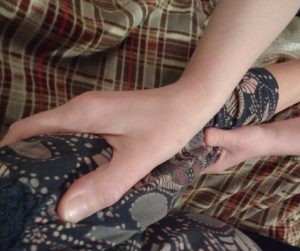A few years ago, I worked part-time at Waterstone’s (yes, I’m putting the apostrophe in even though it’s now been dropped from the signs and literature; too alienating and elitist or something), where I was in charge of “MBS”: health, religion, self-help, personal development and various other things. This meant that I Iearned more than I might otherwise have done about what Steven Fry has dismissed as ‘shivering madness[es]’—crystal healing, Angel Cards, Ordering from the Universe and so on. But it also meant that I got to spend quite a lot of time upstairs, where non-fiction, poetry and other splendid things lived. I remember unpacking The Stranger in the Mirror from the tote and thinking ‘What a brilliant title. I’ll read that some day’. I knew it wasn’t time yet—but a few years later, it is time, and I’ve read it. I found it profoundly moving.
As one who has spent the occasional bit of mirror-time, of late, lifting one side of my face and looking glumly at the resulting lopsided young/middle-aged reflection, I found the book’s inspired title encapsulated a feeling which is about so much more than looks (though coming to terms with the changes in looks is a thing to do in itself). I recognised, instantly and deeply, that sense of the defamiliarisation of ourselves which time brings about. Shilling describes herself as being ‘taken by surprise’ by middle-age. I get that, and suspect that others may, too.
Quoting Julian Barnes on what he terms ‘le reveil mortel‘—that is, the moment of apprehending the reality of one’s own mortality—Shilling notes that it wasn’t so much that this was news, but that she saw her life as a failure,
nothing behind me but mistakes and disappointments, and nothing ahead but the prospect of a series of small and large betrayals by the body that I had inhabited so insouciantly until now, until the moment of final, catastrophic betrayal.
Phew. I’m not resorting to cliche here when I say I found this book piercingly honest. I simply mean that Shilling’s realness, her willingness to say things that others might dismiss as “feeling sorry for herself” (how I LOATHE that phrase), instantly, painfully found their way to the heart of me, and to some of the sorrows and terrors I have about midlife, ageing and dying. Never having laboured under the burdens of great beauty and stylishness, I don’t relate so immediately to the the chapters about dress and style. But the stuff about middle-age as a reckoning point, a place where we review, reflect, acknowledge, lament, grieve…? Yes. I wept many times as I read this book, but am glad to have done so. They were the howls and keenings which denote irrevocable loss and, as such, were necessary and important.
I loved the directness and honesty of The Stranger, manifest from the Preface—’At 47 I thought that steady nerve, a good haircut and an enquiring mind would be sufficient protection against most of the outrages that middle age might inflict. By 50 I knew better’—and throughout. Without being Eeyore, or denying what there is to be celebrated about ageing, Shilling refuses to have the realities of middle-age elided or given some misleading gloss. Commenting on Gloria Steinem’s description of later life as a ‘”go[ing] back to that clear-eyed, shit-free”‘ way of being that childhood enjoys, but with the welcome addition of the kinds of power and agency children rarely have, Shilling notes:
Although there are good reasons to be upbeat about growing old, it is a mistake to think that life’s journey is circular. Getting old does not involve a return to anywhere. It is an onward passage to an unknown destination.
And the unknown is often frightening. The Stranger in the Mirror honours the intensities to be experienced in middle-age. It has much about being lost—from oneself, in the world; familiar waymarkers and trig points shift or vanish in middle-age—and about the fear which comes with being lost, and loss. It celebrates life’s richness and owns the anguish of things passing. Shilling seems wonderfully qualm-free about sharing her emotions, and I love that. We read to know we are not alone.
It is refreshing that Shilling offers us no consolatory rom-com narrative of Salvation-through-Relationship (though the importance of relationship, or relatedness-with-others, is never denied). I was rejoicing in feeling so accompanied, right until the final two sentences of the acknowledgements: ‘My dear son Alexander tolerates with patience and generosity the trials of having a writing mother. He is the point of it all’. At the time of first reading those closing words, they plunged me into despair: I felt abandoned and—for some time at least, while gasping with pain—betrayed. Now, more than 2 years (and a lot of grieving) since I first read those words, I can deal with them, see them for what they are: her truth. Not the truth.
As you will have gathered, The Stranger in the Mirror is not chirpy self-help, hot-flushes-and-the-highway-to-happiness style! Nonetheless, I found it very helpful indeed; an absorbing, moving read which made me at home in Shilling’s world and more so in my own. I’d be very interested to hear what you think.
 The odd pizza? Yes. Some piazze? Certainly. But… a penis (plus veg. accompaniment), deliberately worn outside the trouser, at a vaporetto stop at 3 in the afternoon? Nobody mentioned that in the guidebooks. No wonder they called the film Don’t Look Now.
The odd pizza? Yes. Some piazze? Certainly. But… a penis (plus veg. accompaniment), deliberately worn outside the trouser, at a vaporetto stop at 3 in the afternoon? Nobody mentioned that in the guidebooks. No wonder they called the film Don’t Look Now. “…and I don’t need to see your pants.”
“…and I don’t need to see your pants.”